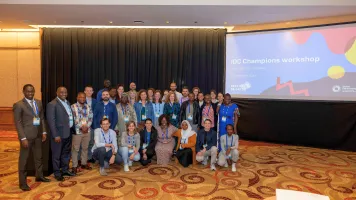This piece is part of a Global Disability Summit blog series from Inclusive Data Charter Champions.
When Nepal was struck by a magnitude 7.8 earthquake in April 2015, persons with disabilities were among those hit hardest. Many persons with disabilities struggled to access temporary shelters and health services. Children with disabilities missed out on school and lacked training on what to do during post-earthquake tremors. When asked why their needs were largely overlooked, the director of an NGO supporting disability inclusion in Nepal explained, “people with disabilities were somehow not counted… not integrated in the disaggregation of data.”
There is growing recognition that the lack of disability-inclusive data is a key challenge to understanding and addressing the unique risks and challenges persons with disabilities face before, during, and after displacement. Collecting data disaggregated by disability status is essential to tackling discrimination and informing more inclusive humanitarian planning and responses.
While the principles of accessibility and universal design should be standard practice even if data is lacking, disaggregated data can assist actors to tailor their interventions more effectively, identify hidden barriers, and assess the inclusivity of responses. It can also reveal opportunities and highlight how intersecting factors, like a person’s age, sex, and type of disability can affect their experiences of displacement.
That’s why, as a Champion of the Inclusive Data Charter, the Internal Displacement Monitoring Centre (IDMC) is seeking to generate better evidence on the differentiated impacts of displacement on persons with disabilities. As a first step, we have incorporated the Washington Group Short Set into our household surveys of Internally Displaced Persons (IDPs) and non-displaced persons as part of studies on displacement linked with conflict, violence, and disasters in Ethiopia, Nigeria, Somalia, Colombia, Nepal, Indonesia, Papua New Guinea, and Vanuatu.
In addition to disaggregating the results by disability status, we have also included a specific module in our household surveys on the barriers IDPs with disabilities face, and conducted key informant interviews with organizations of persons with disabilities and NGOs working on disability inclusion in each context.
The evidence gathered highlights how displacement can disproportionately affect the health, housing, livelihoods, education and security of persons with disabilities. For instance, 70% of IDPs with disabilities displaced by drought surveyed in Gode Woreda, Ethiopia, said their physical health had worsened since leaving their home, compared with 43 per cent of IDPs without disabilities.
The findings were similar in Caucasia, Colombia, where 87% of persons with disabilities displaced by violence said they do not receive specialized healthcare or equipment to help with their displacement, while 90 percent said they had never been consulted about how assistance could be adapted to their needs.
Although these efforts represent an important first step, there are still challenges and limitations to this approach. The six questions that comprise the Washington Group Short Set are designed to identify most, but not all, persons with disabilities. The questions tend to be less effective at identifying persons with psychosocial disabilities, for instance, and are not designed to identify children under five.
Where time and resources allow, using the Washington Group Extended Set or the Washington Group/UNICEF Child Functioning Module can assist in better identifying persons with a range of disabilities. Producing disability-inclusive data also means ensuring persons with disabilities are actively involved in designing surveys, training enumerators, and carrying out data collection.
The Global Disability Summit 2022 in February is an opportunity for governments, NGOs, and other stakeholders to strengthen their commitments on disability inclusion, including data disaggregation. During the first summit held in 2018, several important commitments were made by stakeholders to collect more information on persons with disabilities affected by displacement, and incorporate tools such as the Washington Group questions into registration processes.
As conflict, violence, and disasters continue to force more people to flee their homes each year, IDMC will continue to advance the availability and use of data on persons with disabilities in order to galvanize more inclusive action on displacement.

